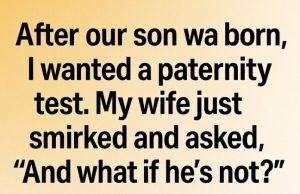
The son appeared at his mother’s funeral only to claim her inheritance, but as he leaned down to bid farewell, he noticed an odd movement inside the coffin.
He stood before the casket, looking as though he was swallowed by grief: eyes shimmering, fingers faintly shaking. Friends and neighbors gathered around, glancing at him with pity, nodding in silent sympathy. Yet no one suspected that behind this mask lay not sorrow, but cold calculation.
The son came to his mother’s funeral only to claim her inheritance, but as he leaned down to bid farewell, he noticed an odd movement inside the coffin.
He stood before the casket, looking as though he was swallowed by grief: eyes shimmering, fingers faintly shaking. Friends and neighbors gathered around, glancing at him with pity, nodding in silent sympathy. Yet no one suspected that behind this mask lay not sorrow, but cold calculation.
For years he had drifted away from his mother. He called only when he needed money—always with some excuse: a lingering debt, a failed venture, or problems at work. His mother trusted her only son, offering help, never realizing her generosity was being exploited. Then one morning came grim news—his mother had died suddenly, taken by a heart attack.
For him, it became a chance. With no other heirs, the house, car, and business would fall entirely into his hands.
Mourners wept during the service: women hid their faces behind dark scarves, men stood solemn, wiping away tears. Only the son felt nothing. Yet, for appearances’ sake, to keep his role as the “devoted child,” he approached the coffin. He bent low over her body, faked a deep sob, and brushed away an imaginary tear. Everyone believed the display, convinced he was mourning.
Inside, however, he felt the opposite. “At last your watch over me is finished. Now it’s all mine,” he thought, even smiling faintly. To conceal it, he leaned close to whisper:
—Now your fortune is mine… selfish woman.

As he tried to straighten up, a sudden flicker inside the coffin caught his eye, nearly knocking him to the ground in terror.
At first he thought it was just his imagination—a slight tremor of a hand or a wrinkle in the fabric. But when his mother’s eyelids quivered, his knees weakened.
The coffin seemed alive. Slowly, she opened her eyes, staring at him with piercing force. The crowd gasped; some screamed, yet none could turn away.
“So it’s true…” Her voice was low but steady. “You never loved me. You only craved my money. And now… I heard everything.”
The son’s face drained of color. He staggered back, choking for breath, nearly collapsing. His act was useless now; every gaze fell on him, exposing the lie.
It was revealed that the funeral was a ruse. Relatives and doctors had known of her “death.” She had survived the att:ack, but chose to stage everything—wanting to test her son’s heart.
Now the truth stood bare. The one who dreamed of inheriting her wealth was left with nothing.
This time, his tears were genuine—but born of fear and disgrace, not love or mourning.















